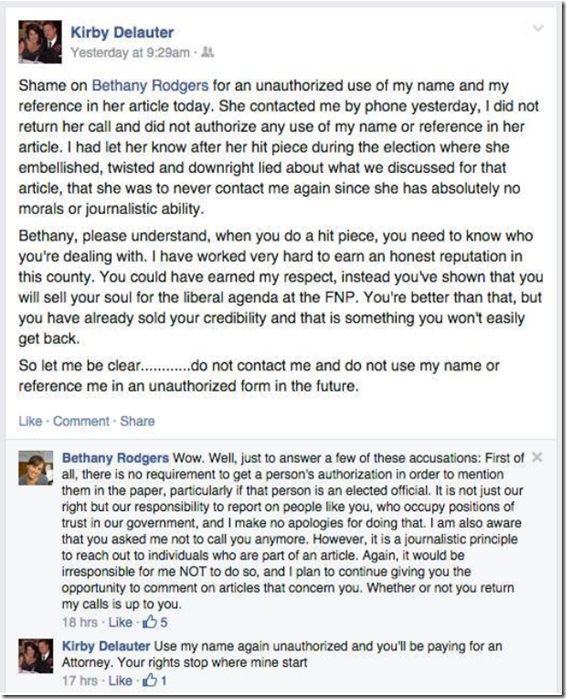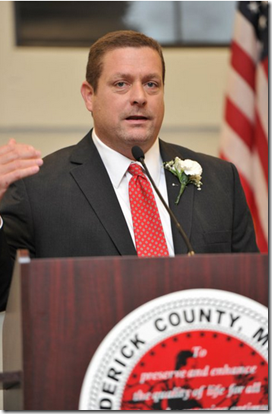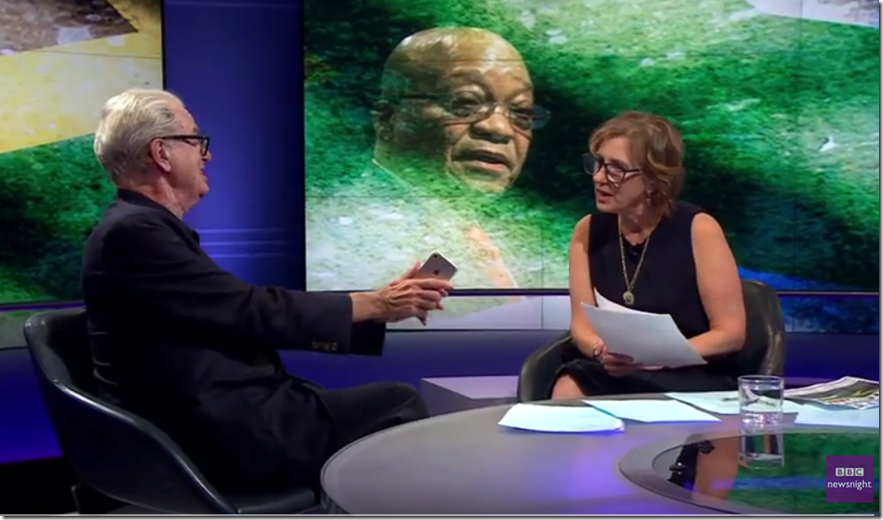Elected Official: I’ll Sue You If You Publish My Name
If you’re a reporter and want to write about an elected official, do you need to obtain permission from the politician in advance to include their name in your news story?
Of course not. You could imagine the chilling effect on journalism if people elected to positions of power could shut down media inquiries they didn’t like by denying the reporter permission to write about them.
Kirby Delauter, a county council member in Frederick County, Maryland, doesn’t appear to agree. He took to his Facebook page yesterday to denounce a local reporter, Bethany Rodgers of The Frederick News-Post, because he “did not authorize any use of my name.” He also included this rather menacing line: “You need to know who you’re dealing with.”
To cap off his post, Mr. Delauter threatened to sue her: “Use my name again unauthorized and you’ll be paying for an attorney.”
I’d like to give Mr. Delauter the benefit of the doubt. It’s possible that he doesn’t have a lot of media experience and truly believes that he has the right to prevent a journalist from using his name without his authorization. Therefore, I want to use this post to write something productive.
Sir, you have no legal standing on which to sue a journalist for using your name without authorization. In order for a public figure to prove libel, you would need to show that Ms. Rodgers knew her statements to be false or had a reckless disregard for the truth. That’s a legal standard that’s extremely difficult to meet.
As you’ve seen from the reaction to your Facebook post (which appears to have been deleted), you only helped to attract more attention to Ms. Rodgers’ original article; among others, The Washington Post has now helped to make this a national story.
But you’re not without rights.
First, if Ms. Rodgers (or any other journalist) is going to write a story about you with or without your participation in it, you might consider granting her an interview—or at least providing her with a short written statement. Although it might seem paradoxical to exert control by speaking to a reporter you view as unfair, it may not be. The reason for that is something I call “The Rule of Thirds.” I made a video about that here.
If Ms. Rodgers is being unfair, as you assert, this post offers you seven things you can do to respond to a negative news story. To protect yourself, you can insist on only communicating in writing (so you can maintain a paper trail) or recording your interviews (some states require two-party notification before recording, so just tell her you’re recording). You can even call into question her fairness as a reporter by offering evidence that proves she has “lied,” as you stated she did. What you can’t do—at least not credibly—is threaten to sue her for mentioning your name.
There’s one other thing I’d ask you to consider. Whether you like it or not, The Frederick News-Post is going to continue to cover you. Therefore, think about what’s going to serve your interests over the months and years to come. It might be that reducing the antagonism between you and the newspaper serves you best; if so, you might consider requesting a meeting with Ms. Rodgers and her editor to discuss your complaints with the paper’s coverage, point out any inaccuracies, and establish a more productive future working relationship.
The point is that you do have some control here—but it needs to be exercised the right way to be effective. Good luck.
Facebook screenshot via Kai Hagen; photo from Kirby Delauter’s public campaign page.
UPDATE: JANUARY 7, 2015, 10PM
Mr. Delauter issued the following apology today to The Frederick News-Post. It strikes the right tone, appears authentic, and reflects an appropriate amount of self-awareness. It should help put this issue behind him.
“The first amendment is alive and well in Frederick County. As a public figure working to maintain and improve the county, it can be very frustrating to feel misrepresented or misinterpreted by a local media outlet.
Over my career I have fired off my fair share of angry e-mails, which in hindsight I wish I hadn’t. I can’t think of one that had a positive effect. Usually, they only served to escalate the conflict. I thought I had long ago learned the lesson of waiting 24 hours before I hit the send key, but apparently I didn’t learn that lesson as well as I should have.
Of course, as I am an elected official, the Frederick News-Post has the right to use my name in any article related to the running of the county — that comes with the job. So yes, my statement to the Frederick News-Post regarding the use of my name was wrong and inappropriate. I’m not afraid to admit when I’m wrong.
I got elected to serve all the citizens of northern Frederick County, Democrats as well as Republicans. I look forward to the local papers covering my effort in that regard.”
Like the blog? Read the book! The Media Training Bible: 101 Things You Absolutely, Positively Need to Know Before Your Next Interview is available in paperback, for Kindle, and iPad.





[…] to sue a reporter for not obtaining his permission to use his name in a newspaper article, Brad Phillips […]
Is it “Rodgers” or “Rodgers”?
So much for “media training.”
When I was a journalist we learned to spell names correctly. But so much has happened in the last 50 years.
Scott –
You spelled “Rodgers” the same way both times — I suspect you intended for one of them to be spelled as “Rogers,” which would have made your point more effectively. I guess that proves that you, like me, are human and sometimes make mistakes. Unlike you, however, I wouldn’t call your journalistic bona fides into question as a result.
I’ll make the fix.
Best,
Brad
Kirby Delauter’s hollow threat may come back to bit him on the fanny. If he engages in frivolous litigation, which will quickly be dismissed, he then could be sued by the journalist in a tort action for which he will be defenseless.
Thanks for your comment, Dave, and good point.
I suspect no self-respecting lawyer would take this case — but at this point, he’d have to sue a few dozen media organizations and bloggers, as well as hundreds of social media users, for using his name without authorization.
Thanks for reading,
Brad
This is the USA, mister, where the public is encouraged to libel and slander public officials — unlike the laws of England meant to protect their sissy aristocratic class. What are you… a red coat, Whig-loving, knee bender to the crown? 🙂
As an elected/appointed representative AND/OR paid government worker, Kirby, your job description, transparency issues, and naming/imagery rights are basically and subjectively owned by the public at large. I’m sure your lawyer can direct you to the proper rules (summed up appropriately enough if you look at parody laws).
Thus situations like a “defamation of character” lawsuit by Sarah the Quitter Palin will never be brought into a courtroom. Even she knows that is futile.
However, Kirby, I’m sure if you want it known you do not endorse any use of your name in public records and future elections/appointments, your name can be erased from history.
[…] He who shall not be named. […]
Brad:
As always a thoughtful analysis and good advice for the politician. I predict that the advice won’t be taken and not because it is wrong.
The fact that a legal case is not winnable is irrelevant because Mr. Delautur is playing the “lying media” card. Blame the media for our troubles is standard operating procedure for a few politicians. It resonates with some voters who don’t like current society. It has the added benefit of pre-disposing the politician’s supporters for accepting any news in the media. So even if the newspaper publishes facts that don’t look good, your supporters won’t accept them.
Let’s hope that the value of your post is in potential politicians who read it and learn practical methods for working with rather than against the media.
Hi Chris,
Thank you very much for your kind comment.
I agree with your analysis completely — I label the dynamic you described as “working the ref,” although it might be more accurate to call it “neutralizing the ref.” This blog post about Marco Rubio from a few years ago has more: https://www.throughlinegroup.com/2011/10/20/when-you-should-attack-the-media/.
Thanks for reading, and Happy New Year.
Brad
you might be a republican if you say you love this country, but have no clue about the founding principles
It is good to see the Frederick News Post has a sense of humor….trying to find out what the original article might be about, I went to the newspaper website and they’ve posted an editorial where they directly answer his demand not to use his name….by using it alot 😀
http://www.fredericknewspost.com/news/politics_and_government/kirby-delauter-kirby-delauter-kirby-delauter/article_da85d6f4-fa3c-524f-bbf6-8e5ddc0d1c0a.html
[…] Maryland county council member to reporter: I’ll sue if you use my name again: […]
Why not just honor his wishes as in : “Unidentified city council member saves drowning baby”, “Unidentified city council member saves city $6 million”.
four + 5 = 9
[…] See that story here https://www.throughlinegroup.com/2015/01/06/elected-official-ill-sue-you-if-you-publish-my-name/ […]
[…] as Brad Phillips at Mr. Media Training puts […]
I think you were a little too kind on this one Brad, possibly because you may have missed what happened just before the apology statement. Delauter’s buddy on the County Council spoke on his behalf and the two don’t seem to agree on what the truth is about what happened. Here’s what I wrote on Facebook about it:
Kirby Delauter has so little respect for the role of journalists he didn’t bother to get the apology right after one of the most embarrassing days for any politician who has bullied a reporter for publishing the truth. Delauter’s buddy and defender on the Frederick (MD) County Council says Kirby was just kidding when he threatened to sue a Frederick News-Post (FNP) reporter for using his name without permission. Councilman Billy Shreve told WUSA-TV’s Bruce Leshan, “The joke is on you in the media and the liberal press, absolutely.” Yet, a little bit later Delauter issued a statement saying he was frustrated with the FNP reporter, ””Over my career I have fired off my fair share of angry e-mails, which in hindsight I wish I hadn’t.” Sounds more like an anger management problem than a “joke”. Seems we have a pair of politicians who just don’t think the truth is that important.
In the meantime, the loss of some seriously funny people who knew exactly how to deal with petty political leaders and others, reminds us that freedom of the press is not a joke.